The CHS supports scholars and their research with a variety of configurations. All fellows receive an appointment for at least one academic year. Fellows receive varying levels of support and may reside at the Center for a term up to 18 weeks, depending on the scope and needs of their proposed projects. For more information about their research, see the CHS Research Bulletin.
 Peter Agócs grew up in Canada and was educated in Budapest and in Great Britain. He is a lecturer at University College London, teaching classical languages and culture. He works mainly on the poetics of archaic and classical Greek song, and on mythical narratives as a form of cultural memory in the fifth century BC. He has published on Pindar and Bacchylides, tragedy, epic, and ideas of memory and textuality in early Greek culture, has edited (with his collaborators Richard Rawles and Chris Carey) two conference volumes on epinician poetry, and (with Lucia Prauscello) is currently putting together a third one on Simonides. At the CHS, he’ll be preparing his book on the ethnography of early Greek song for publication.
Peter Agócs grew up in Canada and was educated in Budapest and in Great Britain. He is a lecturer at University College London, teaching classical languages and culture. He works mainly on the poetics of archaic and classical Greek song, and on mythical narratives as a form of cultural memory in the fifth century BC. He has published on Pindar and Bacchylides, tragedy, epic, and ideas of memory and textuality in early Greek culture, has edited (with his collaborators Richard Rawles and Chris Carey) two conference volumes on epinician poetry, and (with Lucia Prauscello) is currently putting together a third one on Simonides. At the CHS, he’ll be preparing his book on the ethnography of early Greek song for publication.
 Rodney Ast has a PhD in Classics from the University of Toronto and has worked since 2009 as Research and Teaching Associate in the Institute for Papyrology at the University of Heidelberg. His main areas of interest are Greek and Latin documentary and literary papyrology and paleography; the cultural and social history of Greco-Roman Egypt; Egyptian archeology; Digital Humanities. He has edited several books and numerous articles concerned with Greek and Latin papyrological and inscriptional texts. He takes part regularly in excavations at Amheida in Egypt’s Dakhla Oasis and serves as co-editor of Greek and Latin texts from the Eastern desert site of Berenike. His time at the CHS will be spent on a study of writers, their offices, and the general culture of writing in Greco-Roman Egypt.
Rodney Ast has a PhD in Classics from the University of Toronto and has worked since 2009 as Research and Teaching Associate in the Institute for Papyrology at the University of Heidelberg. His main areas of interest are Greek and Latin documentary and literary papyrology and paleography; the cultural and social history of Greco-Roman Egypt; Egyptian archeology; Digital Humanities. He has edited several books and numerous articles concerned with Greek and Latin papyrological and inscriptional texts. He takes part regularly in excavations at Amheida in Egypt’s Dakhla Oasis and serves as co-editor of Greek and Latin texts from the Eastern desert site of Berenike. His time at the CHS will be spent on a study of writers, their offices, and the general culture of writing in Greco-Roman Egypt.
 Francisco Barrenechea (PhD Columbia University) is an Assistant Professor of Classics at the University of Maryland, College Park. His research interests include Greek drama, in particular Old Comedy and Euripides, and the performance and reception of ancient theater in Latin America. He has published several articles on Mexican adaptations of Greek tragedy, which he will expand into a book on the topic, and has also written on the poet Lucan, papyrology, and fragmentary ancient drama. At the CHS, he will work on a monograph that explores how ancient Greek comedy responded to transformations in the religious life of the community, as evinced by popular narratives of religious experiences that articulate Aristophanes’ Wealth.
Francisco Barrenechea (PhD Columbia University) is an Assistant Professor of Classics at the University of Maryland, College Park. His research interests include Greek drama, in particular Old Comedy and Euripides, and the performance and reception of ancient theater in Latin America. He has published several articles on Mexican adaptations of Greek tragedy, which he will expand into a book on the topic, and has also written on the poet Lucan, papyrology, and fragmentary ancient drama. At the CHS, he will work on a monograph that explores how ancient Greek comedy responded to transformations in the religious life of the community, as evinced by popular narratives of religious experiences that articulate Aristophanes’ Wealth.
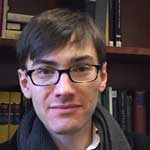 Joshua Billings (DPhil Oxford) is Assistant Professor of Classics at Princeton University. His research focuses on Greek literature and philosophy and modern intellectual history, with a particular concentration on tragedy. He has published one monograph, Genealogy of the Tragic: Greek Tragedy and German Philosophy (Princeton 2014) and two co-edited volumes, Choruses, Ancient and Modern(Oxford 2013) and Tragedy and the Idea of Modernity (Oxford 2015). At CHS, he will be working on a project on drama and intellectual culture at the end of the fifth century BC, provisionally entitled “Enlightenment on stage.”
Joshua Billings (DPhil Oxford) is Assistant Professor of Classics at Princeton University. His research focuses on Greek literature and philosophy and modern intellectual history, with a particular concentration on tragedy. He has published one monograph, Genealogy of the Tragic: Greek Tragedy and German Philosophy (Princeton 2014) and two co-edited volumes, Choruses, Ancient and Modern(Oxford 2013) and Tragedy and the Idea of Modernity (Oxford 2015). At CHS, he will be working on a project on drama and intellectual culture at the end of the fifth century BC, provisionally entitled “Enlightenment on stage.”
 Cédric Brélaz (PhD University of Lausanne, Dr. habil. École Pratique des Hautes Études, Paris) is an Associate Professor of Ancient Greek History at the University of Strasbourg, France. He was Member of the Swiss Institute in Rome, Foreign Member of the French School of Archaeology at Athens and Visiting Research Fellow at the Centre for the Study of Ancient Documents, Oxford. His research focuses on Greek political institutions in the Hellenistic and Imperial periods, on Roman provincial administration in the Eastern Mediterranean and on Greek and Latin epigraphy. His publications include the books La sécurité publique en Asie Mineure sous le Principat (2005) and Corpus des inscriptions grecques et latines de Philippes, II.1. La vie publique de la colonie romaine (2014). He has co-edited volumes on public order in the ancient world, on ancient Greek warfare and on Roman colonization. His project at the CHS will deal with Greek political mentalities and practice under Roman rule and will focus on the changes in Greek political culture in the Imperial period.
Cédric Brélaz (PhD University of Lausanne, Dr. habil. École Pratique des Hautes Études, Paris) is an Associate Professor of Ancient Greek History at the University of Strasbourg, France. He was Member of the Swiss Institute in Rome, Foreign Member of the French School of Archaeology at Athens and Visiting Research Fellow at the Centre for the Study of Ancient Documents, Oxford. His research focuses on Greek political institutions in the Hellenistic and Imperial periods, on Roman provincial administration in the Eastern Mediterranean and on Greek and Latin epigraphy. His publications include the books La sécurité publique en Asie Mineure sous le Principat (2005) and Corpus des inscriptions grecques et latines de Philippes, II.1. La vie publique de la colonie romaine (2014). He has co-edited volumes on public order in the ancient world, on ancient Greek warfare and on Roman colonization. His project at the CHS will deal with Greek political mentalities and practice under Roman rule and will focus on the changes in Greek political culture in the Imperial period.
 Naomi Carless Unwin (PhD University College London) is a postdoctoral researcher, working on the history, epigraphy and archaeology of Karia in south western Anatolia. After completing a BA at Oxford University in 2006, she moved to University College London, where she completed her MA in Ancient History in 2008 and her PhD in 2013. She was employed in the 2013/2014 academic year as a Fernand Braudel IFER-FMSH post-doctoral fellow, affiliated to the Labex Resmed in Paris, where her project was focused on religion and society in Karia. She has subsequently continued this project as a Senior Fellow at the Research Center for Anatolian Civilizations at Koç University in Istanbul (2014/2015), and the CHS/DAI fellowship for 2015/2016 will be used to develop this research into a monograph. She has participated for a number of years in the archaeological excavations at Labraunda, where she works primarily on the epigraphy of the site.
Naomi Carless Unwin (PhD University College London) is a postdoctoral researcher, working on the history, epigraphy and archaeology of Karia in south western Anatolia. After completing a BA at Oxford University in 2006, she moved to University College London, where she completed her MA in Ancient History in 2008 and her PhD in 2013. She was employed in the 2013/2014 academic year as a Fernand Braudel IFER-FMSH post-doctoral fellow, affiliated to the Labex Resmed in Paris, where her project was focused on religion and society in Karia. She has subsequently continued this project as a Senior Fellow at the Research Center for Anatolian Civilizations at Koç University in Istanbul (2014/2015), and the CHS/DAI fellowship for 2015/2016 will be used to develop this research into a monograph. She has participated for a number of years in the archaeological excavations at Labraunda, where she works primarily on the epigraphy of the site.
 Charles Doyen (PhD University of Louvain) is a F.R.S–FNRS Research Associate at the University of Louvain, Belgium. His research aims to contextualize the monetary phenomenon in Hellenistic Greece by taking non-numismatic evidence into account. Within this framework, Charles is currently developing an epigraphical corpus of inscriptions related to Hellenistic metrology and accounting practices, as well as a digital database of the commercial weights dated from the Classical and Hellenistic periods. He was appointed to the Francqui Chair at the University of Namur (2013) and was invited as an Assistant Professor at the École pratique des Hautes Études, Paris (2015). He has published Poséidon souverain (revised doctoral dissertation, 2011) and Étalons de l’argent et du bronze en Grèce hellénistique (2012).
Charles Doyen (PhD University of Louvain) is a F.R.S–FNRS Research Associate at the University of Louvain, Belgium. His research aims to contextualize the monetary phenomenon in Hellenistic Greece by taking non-numismatic evidence into account. Within this framework, Charles is currently developing an epigraphical corpus of inscriptions related to Hellenistic metrology and accounting practices, as well as a digital database of the commercial weights dated from the Classical and Hellenistic periods. He was appointed to the Francqui Chair at the University of Namur (2013) and was invited as an Assistant Professor at the École pratique des Hautes Études, Paris (2015). He has published Poséidon souverain (revised doctoral dissertation, 2011) and Étalons de l’argent et du bronze en Grèce hellénistique (2012).
 Paul J. Kosmin was born and raised in London. Having read Ancient and Modern History at Balliol College, Oxford (BA 2005), he moved to Harvard University for his PhD (2012). His first book, The Land of the Elephant Kings: Space, Territory, and Ideology in the Seleucid Empire (HUP, 2014), examines the relationship between the kings of the Seleucid dynasty and the landscape, from Bactria to Thrace, over which they ruled. More generally, Paul is interested in Hellenistic kingship and imperialism, ancient ethnography, interactions between the Greek and Near Eastern worlds, and Greek epigraphy. Current projects include a study of indigenous resistance to Hellenistic imperialism and an investigation of the role of magical rituals in city-state politics.
Paul J. Kosmin was born and raised in London. Having read Ancient and Modern History at Balliol College, Oxford (BA 2005), he moved to Harvard University for his PhD (2012). His first book, The Land of the Elephant Kings: Space, Territory, and Ideology in the Seleucid Empire (HUP, 2014), examines the relationship between the kings of the Seleucid dynasty and the landscape, from Bactria to Thrace, over which they ruled. More generally, Paul is interested in Hellenistic kingship and imperialism, ancient ethnography, interactions between the Greek and Near Eastern worlds, and Greek epigraphy. Current projects include a study of indigenous resistance to Hellenistic imperialism and an investigation of the role of magical rituals in city-state politics.
 Stavros Kouloumentas (PhD University of Cambridge) is a Fernard Braudel postdoctoral fellow at the Centre Léon Robin in Paris IV-Sorbonne. He has been a part-time lecturer at the University of Patras (2011) and an Alexander von Humboldt research fellow at the Humboldt University of Berlin (2012-5). He is currently completing an edition of the texts pertaining to Alcmaeon of Croton, along with introductory notes and commentary. His main interests lie in the interaction between philosophy and medicine, the transmission of philosophical texts in antiquity, and the emergence of rational thinking in ancient Greece. His research at CHS will deal with the sophistic movement and the criticism of traditional religion.
Stavros Kouloumentas (PhD University of Cambridge) is a Fernard Braudel postdoctoral fellow at the Centre Léon Robin in Paris IV-Sorbonne. He has been a part-time lecturer at the University of Patras (2011) and an Alexander von Humboldt research fellow at the Humboldt University of Berlin (2012-5). He is currently completing an edition of the texts pertaining to Alcmaeon of Croton, along with introductory notes and commentary. His main interests lie in the interaction between philosophy and medicine, the transmission of philosophical texts in antiquity, and the emergence of rational thinking in ancient Greece. His research at CHS will deal with the sophistic movement and the criticism of traditional religion.
 Christopher Moore (PhD University of Minnesota) is Assistant Professor of Philosophy and Classics at The Pennsylvania State University. His dissertation, “Socratic Persuasion,” addressed Socrates’ self-presentation in the language of democracy, oratory, and seduction, and argued for an analysis of persuasion that weakens the charges against it of epistemic poverty. He has published a range of articles on the Socratic circle, the Platonic dialogues, and ancient Greek moral vocabulary. A book, Socrates and Self-Knowledge, will come out with Cambridge UP in 2015; it describes the relationship between the Delphic gnôthi sauton and Socratic philosophy. He is now finishing an edited collection on the Socratic literature from the fifth-century BC through late antiquity and co-authoring a translation of and commentary on Plato’s Charmides. His CHS book project describes the coining of and earliest debates about the word philosophos.
Christopher Moore (PhD University of Minnesota) is Assistant Professor of Philosophy and Classics at The Pennsylvania State University. His dissertation, “Socratic Persuasion,” addressed Socrates’ self-presentation in the language of democracy, oratory, and seduction, and argued for an analysis of persuasion that weakens the charges against it of epistemic poverty. He has published a range of articles on the Socratic circle, the Platonic dialogues, and ancient Greek moral vocabulary. A book, Socrates and Self-Knowledge, will come out with Cambridge UP in 2015; it describes the relationship between the Delphic gnôthi sauton and Socratic philosophy. He is now finishing an edited collection on the Socratic literature from the fifth-century BC through late antiquity and co-authoring a translation of and commentary on Plato’s Charmides. His CHS book project describes the coining of and earliest debates about the word philosophos.
 Anne-Sophie Noel (PhD University of Lyon) graduated from the École Normale Supérieure of Lyon, and has completed her PhD thesis at the University of Lyon 3 in 2012. She is currently an associate researcher at HiSoMA (Histoires et Sources des Mondes Antiques, UMR 5189, Lyon). She has taught on a wide range of subjects, in the field of Classics and French literature, at secondary and academic levels (University of Lyon 3, Paris X and Exeter). Her first research interests lied in Greek and Roman drama, particularly in ancient performance of Greek tragedy and comedy: her thesis was a comprehensive study of the theatrical objects in Aeschylus, Sophocles and Euripides’ dramas, which also questioned modern reception and modern stagings of the objects of ancient tragedy. She is also part of a teamwork devoted to the translation and commentary of Pollux’ Onomasticon, book IV (Paris) and she collaborates to a project of translation and commentary of the ancient sources about the spectators in the Antiquity (GDR THEATHRE, Paris). While at the CHS, Anne-Sophie will be developing her new research project on the expression of feelings for objects in Ancient Greece, at the crossroads of literature, cultural history, material culture and anthropology. A performer and amateur stage director, she produced several shows of ancient Greek tragedies in the past years, and is also one of the editors of the French online review Agôn, dedicated to the performing arts.
Anne-Sophie Noel (PhD University of Lyon) graduated from the École Normale Supérieure of Lyon, and has completed her PhD thesis at the University of Lyon 3 in 2012. She is currently an associate researcher at HiSoMA (Histoires et Sources des Mondes Antiques, UMR 5189, Lyon). She has taught on a wide range of subjects, in the field of Classics and French literature, at secondary and academic levels (University of Lyon 3, Paris X and Exeter). Her first research interests lied in Greek and Roman drama, particularly in ancient performance of Greek tragedy and comedy: her thesis was a comprehensive study of the theatrical objects in Aeschylus, Sophocles and Euripides’ dramas, which also questioned modern reception and modern stagings of the objects of ancient tragedy. She is also part of a teamwork devoted to the translation and commentary of Pollux’ Onomasticon, book IV (Paris) and she collaborates to a project of translation and commentary of the ancient sources about the spectators in the Antiquity (GDR THEATHRE, Paris). While at the CHS, Anne-Sophie will be developing her new research project on the expression of feelings for objects in Ancient Greece, at the crossroads of literature, cultural history, material culture and anthropology. A performer and amateur stage director, she produced several shows of ancient Greek tragedies in the past years, and is also one of the editors of the French online review Agôn, dedicated to the performing arts.
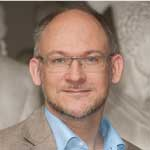 Sven Schipporeit (PhD Heidelberg University) teaches at the University of Vienna. A Classical Archaeologist, his main focus lies on the interaction between religion, imagery, architecture, urban development and society from archaic Greece to early imperial Rome. This research encompasses a doctoral thesis on “Kulte und Heiligtümer der Demeter und Kore in Ionien” released in 2013 as vol. 16 in the Byzas series including a close look on the Eleusinian mysteries, surveys on cult meals and chariots for the Thesaurus Cultus et Rituum Antiquorum, on votive practice and images, on religion and politics in Ionia and Sicily, and on several topics centered around the Roman Triumph, carried out as Research Fellow in Heidelberg and as Assistant Professor in Vienna at the Departments of Classical Archaeology. As a CHS and DAI fellow he will work on the urban fabric and cultic constitution of synoicized Poleis in late classical and early hellenistic times: Rhodes will serve as a first case study, where the citizens promoted the minor god Helios to patron of the unified city-state, in place of Athena, the widely recognized poliadic goddess of their old three cities.
Sven Schipporeit (PhD Heidelberg University) teaches at the University of Vienna. A Classical Archaeologist, his main focus lies on the interaction between religion, imagery, architecture, urban development and society from archaic Greece to early imperial Rome. This research encompasses a doctoral thesis on “Kulte und Heiligtümer der Demeter und Kore in Ionien” released in 2013 as vol. 16 in the Byzas series including a close look on the Eleusinian mysteries, surveys on cult meals and chariots for the Thesaurus Cultus et Rituum Antiquorum, on votive practice and images, on religion and politics in Ionia and Sicily, and on several topics centered around the Roman Triumph, carried out as Research Fellow in Heidelberg and as Assistant Professor in Vienna at the Departments of Classical Archaeology. As a CHS and DAI fellow he will work on the urban fabric and cultic constitution of synoicized Poleis in late classical and early hellenistic times: Rhodes will serve as a first case study, where the citizens promoted the minor god Helios to patron of the unified city-state, in place of Athena, the widely recognized poliadic goddess of their old three cities.
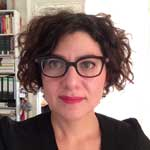 Ioanna Sitaridou (PhD University of Manchester) is University Senior Lecturer in Romance Philology at the Department of Spanish and Portuguese at the University of Cambridge and Fellow and Director of Studies in Linguistics and Modern and Medieval Languages at Queens’ College, Cambridge since 2004. Her main areas of research are the comparative and diachronic syntax of the Romance languages and also dialectal Greek, especially Pontic Greek and Cypriot Greek. The areas in which she carries out research are: the relationship between syntactic change and acquisition, language contact, micro-variation, and phylogenies. Her research has been published in journals such as Diachronica (twice), Lingua (thrice), Natural Language and Linguistic Theory, Folia Linguistica, Catalan Journal of Linguistics, Identity: An International Journal of Theory and Research, The Italianist. She is the author of numerous chapters in books (with Oxford University Press, Cambridge University Press, John Benjamins, Routledge, Visor, among others). Her research has been funded by British Academy twice (#SRG-102639; #SRG 48312) and the University of Cambridge several times (Cambridge Humanities Research Grants Scheme 2014; Newton Trust Small Research Grant 2010; Early Career Fellowship by CRASSH in 2008). In Lent 2012, she received a research buyout by the research project ISWOC, at the Department of Literature, Area Studies and European Languages, University of Oslo, to collaborate on information structure and word order change in the earlier stages of Portuguese and Spanish. For her research on Romeyka she was awarded the Stanley J. Seeger Visiting Research Fellowship in Hellenic Studies by Princeton University in Spring 2011. At the CHS, her project concerns the evolution of Pontic Greek and the development of taxonomic indexes for the recasting of the internal classification of Greek.
Ioanna Sitaridou (PhD University of Manchester) is University Senior Lecturer in Romance Philology at the Department of Spanish and Portuguese at the University of Cambridge and Fellow and Director of Studies in Linguistics and Modern and Medieval Languages at Queens’ College, Cambridge since 2004. Her main areas of research are the comparative and diachronic syntax of the Romance languages and also dialectal Greek, especially Pontic Greek and Cypriot Greek. The areas in which she carries out research are: the relationship between syntactic change and acquisition, language contact, micro-variation, and phylogenies. Her research has been published in journals such as Diachronica (twice), Lingua (thrice), Natural Language and Linguistic Theory, Folia Linguistica, Catalan Journal of Linguistics, Identity: An International Journal of Theory and Research, The Italianist. She is the author of numerous chapters in books (with Oxford University Press, Cambridge University Press, John Benjamins, Routledge, Visor, among others). Her research has been funded by British Academy twice (#SRG-102639; #SRG 48312) and the University of Cambridge several times (Cambridge Humanities Research Grants Scheme 2014; Newton Trust Small Research Grant 2010; Early Career Fellowship by CRASSH in 2008). In Lent 2012, she received a research buyout by the research project ISWOC, at the Department of Literature, Area Studies and European Languages, University of Oslo, to collaborate on information structure and word order change in the earlier stages of Portuguese and Spanish. For her research on Romeyka she was awarded the Stanley J. Seeger Visiting Research Fellowship in Hellenic Studies by Princeton University in Spring 2011. At the CHS, her project concerns the evolution of Pontic Greek and the development of taxonomic indexes for the recasting of the internal classification of Greek.
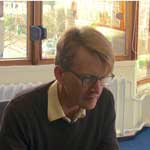 Neel Smith is an associate professor in the Department of Classics at the College of the Holy Cross where he teaches a wide range of courses in ancient languages, archaeology and ancient science. For more than twenty-five years, he has explored the implications of new information technologies for humanists, including work on the Perseus Project, and for the past ten years as a co-architect of the Homer Multitext project. As faculty advisor to the Holy Cross Manuscripts, Inscriptions and Documents Club since its foundation in 2012, he has been a frequent co-author with undergraduate colleagues on topics growing out of the club’s research.
Neel Smith is an associate professor in the Department of Classics at the College of the Holy Cross where he teaches a wide range of courses in ancient languages, archaeology and ancient science. For more than twenty-five years, he has explored the implications of new information technologies for humanists, including work on the Perseus Project, and for the past ten years as a co-architect of the Homer Multitext project. As faculty advisor to the Holy Cross Manuscripts, Inscriptions and Documents Club since its foundation in 2012, he has been a frequent co-author with undergraduate colleagues on topics growing out of the club’s research.
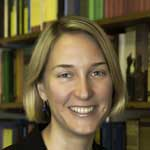 Caroline Stark (PhD Yale) is Assistant Professor of Classics at Howard University. Her research interests include ancient cosmology, anthropology, ethnography, and the reception of classical antiquity in later periods and other cultures, especially Medieval and Renaissance Europe/Mediterranean and contemporary African, Caribbean, and African-American Literature. For recent publications, see her page on academia.edu. At the CHS, she will be continuing her research on ancient stories of creation and their reception in the intellectual and cultural history of the fifteenth and sixteenth centuries, and she will be creating on an online resource for Black Classicism and receptions of the ancient Mediterranean in Black World Studies.
Caroline Stark (PhD Yale) is Assistant Professor of Classics at Howard University. Her research interests include ancient cosmology, anthropology, ethnography, and the reception of classical antiquity in later periods and other cultures, especially Medieval and Renaissance Europe/Mediterranean and contemporary African, Caribbean, and African-American Literature. For recent publications, see her page on academia.edu. At the CHS, she will be continuing her research on ancient stories of creation and their reception in the intellectual and cultural history of the fifteenth and sixteenth centuries, and she will be creating on an online resource for Black Classicism and receptions of the ancient Mediterranean in Black World Studies.
 Saro Wallace received her PhD from the University of Edinburgh in 2001. She started her career as an archaeologist in the National Trust for Scotland before coming to focus on Bronze to Iron Age cultural landscapes in Crete. A particular interest was the adjustments in social and economic practice in Greece after the collapse of Bronze Age palatial societies c. 1200 BC, and the ways these fed into the special types of small state formation seen in the region by around 700 BC. From 2002 she developed and directed a landscape survey, building recording, and excavation project around the large site of Karfi in Crete (founded 1200 BC) under the auspices of the British School at Athens, and is currently engaged in publishing the results in monograph form. She held full-time lectureships in Mediterranean and Classical archaeology at the universities of Bristol, Cardiff and Reading (UK) in 2004-2009 and was a Humboldt Senior Research Fellow at the University of Heidelberg for two years in 2010-12. She was the Glassman Holland Research Fellow at the Albright Institute, Jerusalem, 2012-13. Her first monograph, Ancient Crete, was published by CUP in 2010 and her latest synthetic work Time travellers: imagining movement in the ancient Aegean world, is currently in press.
Saro Wallace received her PhD from the University of Edinburgh in 2001. She started her career as an archaeologist in the National Trust for Scotland before coming to focus on Bronze to Iron Age cultural landscapes in Crete. A particular interest was the adjustments in social and economic practice in Greece after the collapse of Bronze Age palatial societies c. 1200 BC, and the ways these fed into the special types of small state formation seen in the region by around 700 BC. From 2002 she developed and directed a landscape survey, building recording, and excavation project around the large site of Karfi in Crete (founded 1200 BC) under the auspices of the British School at Athens, and is currently engaged in publishing the results in monograph form. She held full-time lectureships in Mediterranean and Classical archaeology at the universities of Bristol, Cardiff and Reading (UK) in 2004-2009 and was a Humboldt Senior Research Fellow at the University of Heidelberg for two years in 2010-12. She was the Glassman Holland Research Fellow at the Albright Institute, Jerusalem, 2012-13. Her first monograph, Ancient Crete, was published by CUP in 2010 and her latest synthetic work Time travellers: imagining movement in the ancient Aegean world, is currently in press.
-
Fellowships
- Fellowships in Hellenic Studies
- Early Career Fellowships
- Summer Fellowships
- CHS-IHR Joint Fellowship
- Current Fellows in Hellenic Studies
- Previous Fellows Previous Fellows – Chronological Lists
-
The Library
- Accessing the Library
- Navigating the Collection and HOLLIS
- Library Exhibits
- New Books
- Book Donations Policy
